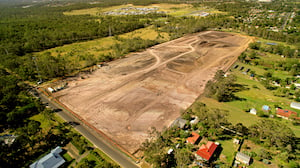CRE Development Mistakes - Structuring Real Estate Development Land Contracts
Never again close on a piece of land before you're comfortable you can develop it.
Our latest video walks you through some of the common mistakes developers and real estate investors make when structuring land contracts.
Guide to the video
- A properly structured contract allows developers to reduce risk throughout their project
- It's important to align your contract with critical land entitlement milestones
- Afford yourself enough time for due diligence to assess the land's critical feasibility items
Video transcript follows
Have you ever put together a contract for a house you bought, or maybe even a commercial property?
The process was pretty straight forward, right? You probably wanted to give yourself some time to do an inspection, some title work, and maybe an environmental assessment.
Now forget all that for this video as we talk about land contracts, and let’s jump right in.
Hey everyone – it’s Matt Marsh with Marsh & Partners.
Marsh & Partners is a development and national consulting firm that helps business owners and investors maximize their real estate and transform their businesses.
----------
Today we’re going to focus on structuring land contracts for real estate development. It’s really an art form as much as it is a science because of how critical it is to time the contract to align with your real estate development timeline.
If you structure your land contract properly, it’s an opportunity to reduce risk on the front end of a project.
But failing to do so leaves you exposed to committing large amounts of capital without any assurances that a project can move forward.
There’s no way to completely reduce your risk during development, but I’m here to help you avoid some big issues in the future projects. Keep watching for some common mistakes made when structuring land contracts.
Giving sellers unrealistic expectations
One of the biggest mistakes developers make when buying land is giving an owner unrealistic closing and timeline expectations.
This happens for several reasons.
Maybe you’re competing with multiple buyers – so you feel the need to offer more money, or a shorter timeline to sweeten the pot.
Or maybe you’re inexperienced and don’t have the repetitions under your belt to properly frame the negotiation.
But here’s the problem. Buying land, especially with the intention of developing that land in the future is different than buying other types of real estate.
Real estate development is risky – you’re not only subject to constraints imposed on you by the physical land, but regulations from local governments and municipalities as well.
Depending on what you’re trying to do on a property, your neighbors may even have influence over what you can and can’t do.
The point is, with all these moving parts, it’s difficult to predict how long you’ll need to close on a property.
A landowner with unrealistic expectations about their land value and time to close can set your real estate development up for failure from the start.
Failure to tie the contract to phases of the land entitlement process
I just mentioned the various 3rd parties that have a say in how and what you can develop on a property. To be allowed to break ground on a project, you need all permits and approvals from those governmental groups.
Those permits and approvals are not merely a formality, either. In many cases, the planning department, and other municipal agencies may delay a project.
So, this creates a quandary.
As a developer, you want to entitle the land as quickly as possible to begin development and construction.
Unplanned carrying costs if the project is delayed can completely blow up your development proforma.
But you have very little control over the speed at which the bureaucratic permitting processes move, or even if your project will be approved.
So, if you buy a piece of land without having the proper land entitlements, you could be stuck with a property that’s useless.
Here’s an idea to help you avoid that.
Next time you structure a land contract, tie it to phases of the actual development process.
Maybe you set earnest money to be released upon successful rezoning or other key land entitlement milestones, and closing could be contingent on an unappealable municipal site plan approval.
That way, you won’t be forced to close on a property until you’re comfortable that you’ll be able to build what you want.
Not giving yourself enough time for due diligence
Due diligence on raw land in preparation for real estate development is a very different process than what you’d encounter when buying a home or a commercial building.
It’s contingent on multiple layers of compounding investigations, 3rd party consultants and their expertise, and circumstances that may be out of your control as a developer.
You won’t ever be 100% confident you can feasibly develop a property until you have an approved site plan, but there are milestones throughout the due diligence and entitlement process that can offer insight into whether your project will be approved or not.
A site sketch and pre-submittal meeting with planning may be important first steps to assess the feasibility of a project.
A determination of any off-site improvements, necessary sitework, and environmental considerations are critical to building a preliminary development budget.
If you structure a land contract to afford yourself enough time to assess some of those critical feasibility items, you’ll reduce a lot of the entitlement risk before your earnest money becomes non-refundable.
----------
I’ve made my fair share of land contract mistakes along the way. I’ve hamstrung myself with too little time for due diligence, offered too much non-refundable money, and closed on properties before I was completely comfortable
But through those mistakes, I’ve learned some best practices to help you avoid issues in the future.
We have a whole video series on common CRE Development mistakes, with videos being added weekly.
Hit the like button and subscribe to our channel below to stay up to date on content to help you through your real estate journey.
You can also check out our site for more real estate insights at marsh-partners.com
Feel free to leave us a comment if there are any other topics you’re interested in or would like us to cover.
Don’t forget to subscribe if you want more content like this and thanks for watching.



